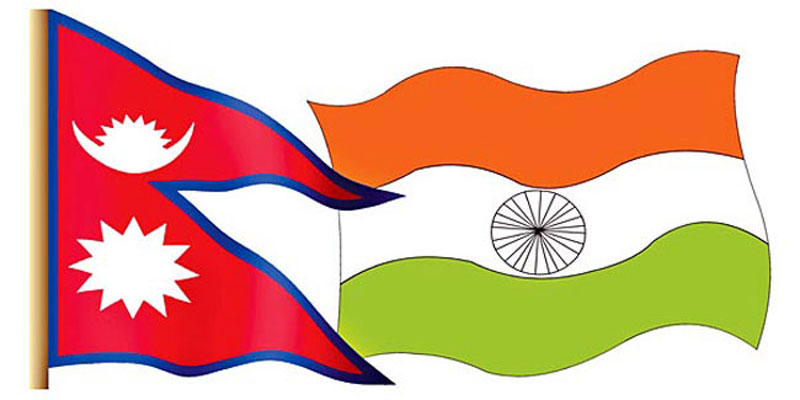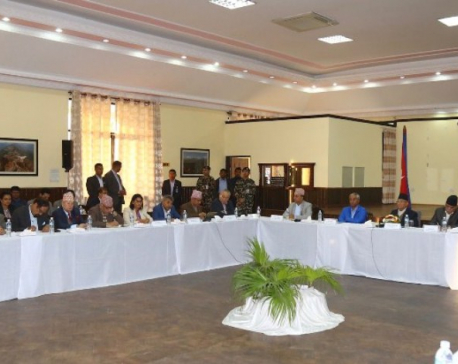
OR
Opinion
The India-Nepal 'Special Relations' Myth
Published On: July 23, 2021 10:50 AM NPT By: Dr Surendra Singh Rawal

The very premise of the "special-relations" is flawed, and so are its futile implementation attempts by the Indian side. Undoubtedly, India wants Nepal to be a good neighbor. In that case, Indian policymakers should shun the mindset of 'special relations’ and focus on friendly and good neighborly relations between the two sovereign countries, putting all major bilateral issues -- including the inert 1950 Treaty -- on the table for renegotiation.
The much-hyped India-Nepal 'Special relations' is a vague term and might mean different things to different people. Indian foreign policy hawks like to infer it as Nepal is under India's suzerainty or security umbrella. However, most Nepalis, and even ordinary Indian citizens, have a different interpretation. They consider the special relationship a social, cultural, and geographical proximity and similarity between the two countries and the peoples. Yet, the South Block approach undermines these historical socio-cultural ties by deliberately mixing the benign notion with political and strategic ambition.
The root of this imbroglio goes back to the 1950 Treaty: a vestige of British colonialism that some Indian foreign policy personnel still harbor. The Indian Embassy in Kathmandu mentions on its website that "The India-Nepal Treaty of Peace and Friendship of 1950 forms the bedrock of the special relations that exist between India and Nepal [the emphasis is mine]." The same is mentioned on the Indian MEA website.
Not only the Indian foreign policy establishment but also Indian Professor SD Muni, in his book, Foreign Policy of Nepal, has tried to justify the so-called special relations by providing the genesis of it. He opines that apart from constant factors like contagious geography, strong socio-cultural similarities, and economic dependency upon India, additional factors such as the legacy of the Rana regime, domestic political scene, and external environment make the "special relation" a default.
Generally, contagious geography, socio-cultural similarities, and economic dependency between any two states are common globally, whether in Europe, the Middle-east, Latin America, or East Asia. These features between India and Nepal are not 'necessary and sufficient conditions' to claim India's supremacy over Nepal. Cross-border socio-cultural and economic relations are part and parcel of the modern-day nation-state system. Such conditions do not demand submission by a small country to a big one, but the hegemonic mindset does.
Citing the Rana regime's legacy, Muni presents another justification that the "Government of independent India only stepped into the British shoe so far as India's defense mechanism and political interests in the Himalayan region were concerned." First of all, it is necessary to identify nuances of the relations that the Rana oligarchs had with the British versus the "special relations" that India has been trying to synthesize. The Ranas’ prime focus was to maintain their oligarchy and tyranny. Second, if India considers that it can continue with the British legacy in Nepal, it would be tantamount to endorsing the British colonial rule in India, even today. Of course, that is not the case. Then there should be no reason to have a separate standard for the 'Petite Republique' Nepal.
Instead, Nepal deserves dignity from India for providing support to India's independence. During the ‘Quit Indian movement’, Nepalis participated in Azad Hind Fauj, sacrificing their lives for the Indian cause. Also, a group of young Nepali social democrats, primarily students, marched hand in hand with Indians to free India from the British rule. These Nepalis were even imprisoned in Indian jails. Unfortunately, some Indians believe that they could pay back the sacrifice of Nepalis who fought for Indian independence by "stepping into the British shoe," depriving Nepal of its cherished freedom.
In another piece of argument, mentioning the domestic political scene, Muni writes, "Unlike the Ranas, the new leadership -- King Tribhuvan and the Nepali Congress leaders -- were not apprehensive of the Government of India." This is not convincing either. If you read the written accounts of prominent Nepali figures such as Yadunath Khanal and BP Koirala, the Nepali perspective becomes more crystallized. Nepal's internal political turmoil and fluid domestic situation forced the King and Congress to acquiesce to Indian polity. Nepali democratic forces wanted a clean break with the Rana tyranny, and they did not have other options except to accept whatever the Indian government offered despite their apprehension.
Prof Muni goes on to justify his "special relations" theory by analyzing the external environment. He argues, "Nepali leaders were apprehensive of China because in 1939 Mao had listed Nepal as a 'tributary state' and in 1950, China had declared its objective of liberating Nepal after liberating Tibet." Muni heavily relies on this argument, implying that Nepal had never been a sovereign country; therefore, India's suzerainty is justified. This argument also has many holes in it.
Foremost, even if Nepal was under the suzerainty of some specific country, that doesn't mean Nepal still has to remain under domination after the decolonization, while India, a former British colony, enjoys independence and freedom. And then, if we go back in history when the British were in India, China considered itself a "Middle Kingdom," in which its periphery was composed of 'lesser states.' The borders between China and its neighborhood were not so much political and territorial demarcations but a cultural differentiation. And, 'tributary states' did not mean suzerainty of China. The Middle Kingdom considered Japan, Korea, Thailand, Vietnam, Cambodia, Malaysia, Philippines, Brunei, Tibet, and Ceylon tributary states, not just Nepal. Additionally, China classified 'West Sea barbarians' as 'tribute envoys' or 'barbarian merchants.' India was under British 'West Sea barbarians.'
China never espoused the notion of universalism or colonialism but confined itself to controlling the barbarians immediately at its doorsteps. The Middle Kingdom considered both Nepal and Britain barbarians. In his book, On China, Henry Kissinger asserts that China did not want to conquer and subjugate the barbarians but to rule them with a loose rein (Ji mi). For those who would not obey its rule, China would exploit divisions among them 'using barbarians to attack barbarians.'
Chinese strategist Wei Yuan, Kissinger wrote, identified Russia, France, America in the West, and the Gurkhas of Nepal, Burma, Thailand, and Vietnam in the East to pit against the British barbarians. He maintained, "Wei Yuan imagined a two-pronged Russian and Gurkha [of Nepal] attack on Britain's most distant and poorly defended interests, its Indian empire." In the light of these historical facts, Mao, an avid reader of history, considered Taiwan, Tibet, Xinjiang, Mongolia, and the regions north of Himalayan as part of historical China, not other tributary states or barbarians. The fear of communism taking over the British Empire was so entrenched in the colonial mindset that they imagined China would go beyond its periphery to subjugate neighbors. It is noteworthy that erstwhile Nepali Ambassador to India, Sardar Bhim Bahadur Pande, recollects in his memoir, Tyas Bakhatko Nepal, that only six countries -- Japan, China, Siam, Nepal, Afghanistan, and Persia -- were the independent countries on Asian Continent in 1920.
So, it isn't easy to comprehend that a scholar like Muni implied that Nepal was under the suzerainty of China. Muni's basic premise to justify the genesis of the special relations and then the argument for its continuity today is a myth. These are the manufactured arguments to deny the sovereignty of a small country by a giant neighbor. Nepal's foreign policy endeavor since the 1950s has been to erase this myth through its ties with the then two superpowers, the US and Soviet Russia, and its active participation in the UN, NAM, or other regional or international forums.
In his Indian Express article, scholar C Raja Mohan writes -"It is a political millstone around India's neck that Delhi is unwilling to shed for fear of losing the 'special relationship'... It makes no sense for Delhi to hanker after a 'special relationship' that a large section of Kathmandu does not want."
The 1950 Treaty was already in a coma once the democratic forces took over Nepal. And, modern independent India trying to carry on a comatose treaty considering itself a successor of the British Raj is just anachronism. Let us believe Indian diplomats and generals will not follow the Athenian ultimatum to Melos that "the strong do what they can, and the weak suffer what they must."
The very premise of the "special-relations" is flawed, and so are its futile implementation attempts by the Indian side. Undoubtedly, India wants Nepal to be a good neighbor. In that case, Indian policymakers should shun the mindset of 'special relations’ and focus on friendly and good neighborly relations between the two sovereign countries, putting all major bilateral issues -- including the inert 1950 Treaty -- on the table for renegotiation. In this regard, the Eminent Persons' Group (EPG) report could be a stepping stone for a new beginning.
You May Like This

Modi wants to see strong and stable Nepal: BJP leader Harsha Vardhan
KATHMANDU, Dec 10: A senior leader of India’s ruling Bharatiya Janata Party (BJP) Harsha Vardhan has said that Indian Prime... Read More...

All-party meet on border issue shows rare unity across entire spectrum
KATHMANDU, Nov 10: Top political leaders including former prime ministers and noted boundary experts have suggested to Prime Minister KP... Read More...

Former PM, FMs advise PM Oli to hold talks with Modi over Kalapani
KATHMANDU, Nov 9: Former Prime Ministers and Foreign Ministers have suggested Prime Minister KP Sharma Oli to hold talks with... Read More...










Just In
- Heavy rainfall likely in Bagmati and Sudurpaschim provinces
- Bangladesh protest leaders taken from hospital by police
- Challenges Confronting the New Coalition
- NRB introduces cautiously flexible measures to address ongoing slowdown in various economic sectors
- Forced Covid-19 cremations: is it too late for redemption?
- NRB to provide collateral-free loans to foreign employment seekers
- NEB to publish Grade 12 results next week
- Body handover begins; Relatives remain dissatisfied with insurance, compensation amount








Leave A Comment